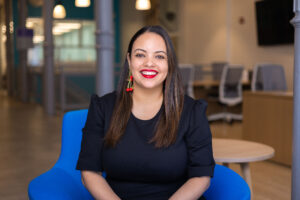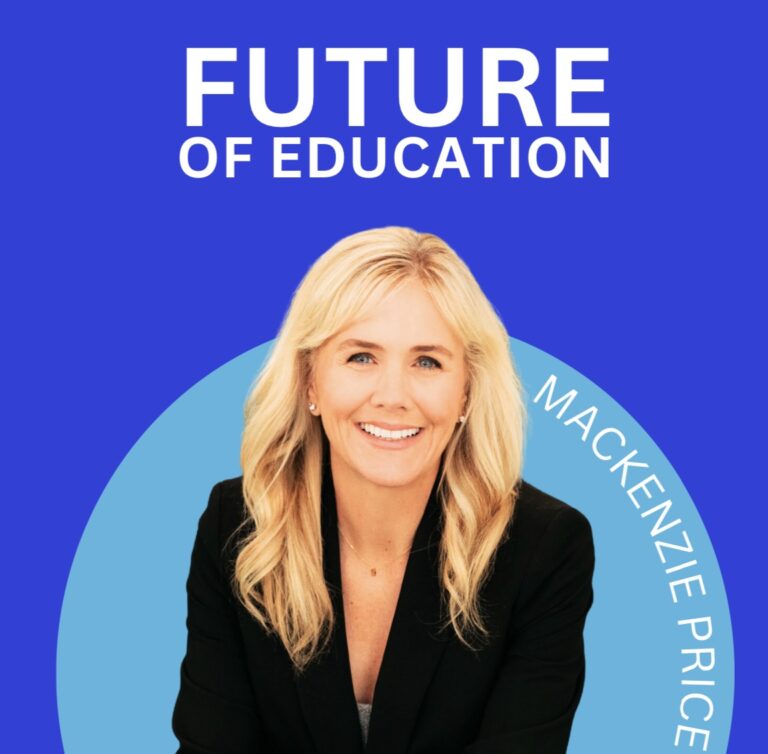Building social capital for 1st gen students — Nolvia Delgado // Kaplan Educational Foundation
Nolvia Delgado
Kaplan Educational Foundation

- Part 1 Building social capital for 1st gen students — Nolvia Delgado // Kaplan Educational Foundation
- Part 2The post-Affirmative Action landscape — Nolvia Delgado // Kaplan Educational Foundation
- Part 3The importance of study stimulation — Nolvia Delgado // Kaplan Educational Foundation
Show Notes
-
01:02Social capital and parental considerationsSocial capital involves equipping students with skills required for professional success, including advocacy, networking, and mentorship. Parents should provide children with the tools to achieve academic and long-term career success.
-
01:48Challenges faced by first generation studentsThe pandemic limited opportunities for first-gen college students to pursue internships and network. As a result, students' social skills have fallen even further behind compared to the pre-COVID era.
-
02:49Reframing social capital for first generation studentsDuring the pandemic, first-gen students developed valuable skills like managing multiple schedules and caring for younger siblings. While not considered traditionally social capital, these abilities are applicable professionally and can be leveraged for internships or future jobs.
-
03:59The relationship between social capital and firstSocial capital significantly influences academic success for first-generation students. Skills like self-advocacy, particularly with professors in the event of issues, are crucial in college and remain a valuable asset throughout their professional careers.
-
06:03Cultural impacts on student teacher dynamicsFor some students from different cultural backgrounds, parents instill a belief that the teacher holds absolute authority, hindering a collaborative partnership in education. When students arent encouraged to view teachers as partners, it limits academic success.
-
06:34The long term impact of building social capitalA bachelor's degree potentially boosts lifetime earnings by over $1.2 million compared to a high school diploma. Encouraging skill acquisition for social capital from high school prepares students better for success at the bachelor's level and beyond.
-
07:20Practical strategies for parents to help children build social capitalRecognize and translate childrens experiences, like babysitting, into professional skills. Parents should also encourage children to respectfully practice self-advocacy and seek out mentors at an early age.
-
08:23Creating mentorship opportunities for childrenParents can create mentorship opportunities by connecting children with their network. Ultimately, parents must recognize their children's experiences as assets and help them identify how existing skills can be translated to the professional setting.
-
12:39Community organizations for mentorshipLocal community-based organizations have the biggest impact on students because they understand the community's needs. Parents should explore and prioritize local community organizations, as they are more likely to effectively address student needs.
-
14:41How parents can support students for academic and professional successListen to what children are comfortable with and avoid pushing too hard, as it might set them back. Factor in the impact of COVID on their education and take the steps to nurture existing skills and support the acquisition of new ones for professional development.
Quotes
-
"A bachelor's degree typically leads to a payoff of over $1.2 million more than a high school diploma. From high school, students should think about acquiring the skills to prepare for success at the bachelor level." - Nolvia Delgado
-
"Students need to have people who can guide them, and parents should nurture that so that students feel comfortable seeking out mentors and understand the importance of it from an early age." - Nolvia Delgado
-
"Removing terms like 'mentor' or 'networking,' and breaking the process down into bite-sized pieces makes it easier for students to approach potential mentors." - Nolvia Delgado
-
"Local community organizations for mentorship understand the needs of the community and can provide the biggest impact on students." - Nolvia Delgado
-
"Listen to your child. Listen to what they're comfortable with. Don't push too hard because that can set them back." - Nolvia Delgado
- Part 1 Building social capital for 1st gen students — Nolvia Delgado // Kaplan Educational Foundation
- Part 2The post-Affirmative Action landscape — Nolvia Delgado // Kaplan Educational Foundation
- Part 3The importance of study stimulation — Nolvia Delgado // Kaplan Educational Foundation
Up Next:
-
Part 1Building social capital for 1st gen students — Nolvia Delgado // Kaplan Educational Foundation
Nolvia Delgado, Executive Director at the Kaplan Educational Foundation, delves into empowering first-generation students in the post-affirmative action landscape. Building social capital prepares students for professional success, equipping them with the skills to network, self-advocate, and connect with mentors. However, first-generation students must navigate several challenges ranging from cultural differences in education to the pandemic’s impact and remote learning. Today, Nolvia discusses building social capital for first-generation students.
-
Part 2The post-Affirmative Action landscape — Nolvia Delgado // Kaplan Educational Foundation
Nolvia Delgado, Executive Director at the Kaplan Educational Foundation, delves into empowering first-generation students in the post-affirmative action landscape. The post-affirmative action era has sparked concerns about access, opportunities, and the overall trajectory for underrepresented students. While the ruling particularly affects first-generation students, there are steps parents can take to help their children navigate this new world of college admissions. Today, Nolvia discusses the post-affirmative action landscape.
Play Podcast -
Part 3The importance of study stimulation — Nolvia Delgado // Kaplan Educational Foundation
Nolvia Delgado, Executive Director at the Kaplan Educational Foundation, delves into empowering first-generation students in the post-affirmative action landscape. Parental support is instrumental in helping first-generation students navigate the post-secondary landscape. From application to graduation and beyond, parents contribute to breaking down barriers, fostering confidence, and providing the necessary resources for their children's academic and career journey. Today, Nolvia talks about the importance of study stimulation.
Play Podcast



